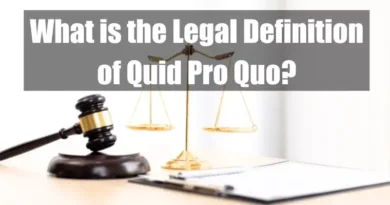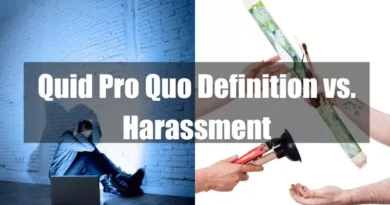Explaining Educational No Quid Pro Quo
Takeaways
| Key Points |
|---|
| The “No Quid Pro Quo” principle in education emphasizes the need for fairness, integrity, and the prevention of coercion or undue influence within learning environments. |
| It ensures that no individual is required to exchange something of value for educational benefits, protecting both students and educators from exploitation and favoritism. |
| Rooted in legal and ethical frameworks, such as Title IX in the United States, this principle is upheld through clear institutional policies, training programs, and transparent reporting processes. |
| However, challenges such as subtle coercion, lack of understanding, and difficulty in proving violations persist, requiring vigilance from educators, administrators, and students alike. |
| By fostering a culture of integrity and continually adapting policies to meet evolving challenges, educational institutions can maintain equitable and ethical learning spaces for all. |
Introduction
The concept of “No Quid Pro Quo” in education addresses the importance of maintaining an environment free from coercion and undue influence. This principle ensures fairness and integrity within educational institutions, creating a safe and equitable learning atmosphere. This article delves into this principle’s meaning, implications, and practical applications, shedding light on its significance and implementation.
Definition of No Quid Pro Quo in Education
“No Quid Pro Quo” translates to “no something for something.” In an educational context, no one should have to provide something of value in exchange for educational benefits. This principle is crucial for preventing exploitation and ensuring that all students have equal opportunities to succeed based solely on their merit.

Importance of No Quid Pro Quo in Educational Settings
In educational environments, maintaining ethical standards is paramount. “No Quid Pro Quo” safeguards against favoritism, bribery, and other unethical practices. It ensures that students are evaluated fairly and that their abilities and efforts determine their success. This principle also protects educators from being coerced into giving undue advantages to certain students.
Historical Context and Legal Framework
The “No Quid Pro Quo” principle has roots in various legal and ethical standards. Over time, educational institutions have adopted policies and regulations to uphold this principle. Laws such as Title IX of the Education Amendments Act in the United States provide a legal framework to address and prevent quid pro quo harassment, ensuring that educational institutions are accountable for maintaining ethical standards.
Implementing No Quid Pro Quo Policies
Educational institutions must establish clear policies to enforce “No Quid Pro Quo.” These policies should outline acceptable behaviors, provide channels for reporting violations, and ensure transparent investigation processes. Training and awareness programs for both staff and students are also essential in fostering an environment where ethical standards are understood and upheld.

Challenges in Upholding No Quid Pro Quo
Despite the importance of “No Quid Pro Quo,” challenges remain in its implementation. Some educators and students may not fully understand the principle or its implications. Additionally, subtle coercion or favoritism can be difficult to detect and prove. Institutions must, therefore, remain vigilant and proactive in addressing these challenges.
The Role of Educators and Administrators

Educators and administrators play a critical role in upholding “No Quid Pro Quo.” They must model ethical behavior, enforce policies consistently, and support those reporting violations. Their commitment to these principles is essential for creating a fair and equitable educational environment.
Student Responsibilities
Students also have a role in maintaining a “No Quid Pro Quo” environment. They should understand their rights and responsibilities, report unethical behaviors, and support their peers in doing the same. By fostering a culture of integrity, students can help ensure that their educational experience is fair and just.
Future Perspectives
As educational environments evolve, the “No Quid Pro Quo” principle will continue to be crucial. Institutions must adapt their policies and practices to address new challenges and uphold ethical standards. Ongoing education and awareness efforts will be key to maintaining a fair and equitable learning environment.
Conclusion
No Quid Pro Quo” in education is more than a legal requirement; it is a fundamental principle that ensures fairness, integrity, and equity. By understanding its importance and actively working to uphold it, educational institutions can create environments where all students have the opportunity to succeed based on their abilities and efforts alone. This principle not only protects individuals but also strengthens the overall integrity of the educational system.
FAQ
What constitutes a violation of the “No Quid Pro Quo” principle in education?
A violation occurs when an individual, typically an educator or administrator, demands or expects something of value from a student in exchange for academic benefits, such as grades, recommendations, or special privileges. This can include requests for personal favors, gifts, or any form of compensation. Such actions compromise the integrity of the educational process and can lead to disciplinary actions or legal consequences.
How can students report a “No Quid Pro Quo” violation?
Students can report violations through established channels within their educational institution. This typically involves contacting a designated office or individual, such as a Title IX coordinator, ethics committee, or trusted faculty member. Institutions often have anonymous reporting options to protect the complainant’s identity. Students must document the incident thoroughly to provide evidence during the investigation.
What are the potential consequences for educators found violating “No Quid Pro Quo” policies?
Educators found guilty of violating “No Quid Pro Quo” policies face serious repercussions. These can include disciplinary actions such as suspension, employment termination, and teaching credentials revocation. Additionally, legal actions might be taken, resulting in fines or imprisonment, depending on the severity of the violation. Institutions may also face reputational damage and legal liabilities if they adequately address such issues.
How can educational institutions prevent “No Quid Pro Quo” incidents?
Institutions can prevent incidents by implementing comprehensive policies and training programs that educate staff and students about ethical standards and reporting procedures. Regular workshops, clear communication of policies, and the establishment of a zero-tolerance stance on unethical behavior are essential. Institutions should also conduct regular audits and assessments to ensure compliance and address potential policy loopholes.
Can “No Quid Pro Quo” principles apply to non-academic aspects of education, such as extracurricular activities?
Yes, “No Quid Pro Quo” principles apply to all aspects of the educational experience, including extracurricular activities. Students should not be coerced into providing something of value in exchange for participation, leadership positions, or benefits in sports, clubs, or other activities. Ensuring fair access and equal opportunities across all areas of student life upholds the integrity and ethical standards of the institution.









